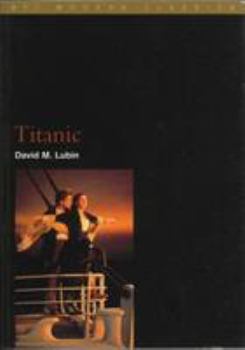Titanic
(Part of the BFI Film Classics Series)
This text looks at Titanic, the first film to earn over a billion dollars at the global box-office. This epic film reimagines one of the defining events of the 20th century through the lens of American romanticism.
Format:Paperback
Language:English
ISBN:0851707602
ISBN13:9780851707600
Release Date:January 2000
Publisher:British Film Institute
Length:144 Pages
Weight:0.60 lbs.
Dimensions:0.5" x 5.3" x 7.5"
Customer Reviews
4 ratings
Better than I thought it would be
Published by Thriftbooks.com User , 19 years ago
For a movie that was almost universally loathed by "high-brow" critics, "Titanic" gets a very lovingly detailed and in-depth analysis courtesy of Mr. Lubin. His analysis is interesting and well-researched without going too overboard or reaching too far for metaphors and artsy-fartsy obscure parallels, as some BFI contributing authors have. This book afforded me a fascinating 12th look at a film I've already seen 11 times, and I feel enriched for having read it. It is scholarly without being boorishly so, and resists the chance to take gratuitous potshots at the flimsiest part of the film -- the dialogue. Lubin rightfully defends writer/director James Cameron's film even at its weakest points, probably because to single out the flimsy and shallow dialogue is to overlook the mastery that went into every other single detail of getting this epic film made. Visually, it is so rich in detail and craft that to malign it for "teen-speak" dialogue is just to be petty. But make no mistake --- Lubin is not playing the cheerleader for the sake of doing so. He is carefully examining the film for its comments on class distinctions, its parallels to art and opera, its classic story structure, and how the timing of the making and release of the film is nearly as significant as the timing of the actual sinking from the perspective of changing cultural and social mores. Or something like that -- Lubin phrases it so much better than I ever could. To those who would chastise Cameron for the dialogue, let's see how well YOU do writing dialogue while simultaneously juggling the 40 thousand details, large and small, of a project this massive! Lubin acknowledges the film's flaws but also pays due heed to the elements that work well, and the film is full of them. Just read the damn book, folks.
Lubin offers valuable insights
Published by Thriftbooks.com User , 23 years ago
David M. Lubin's "Titanic" offers valuable and interesting insights into James Cameron's 1997 Academy Award-winning film by the same title. Lubin, a professor of art at Wake Forest University, brilliantly positions the film within its artistic, historic and cultural context, relating it to art (Frederic Church's "The Icebergs" and "Heart of the Andes," George Caleb Bingham, Jacques-Louis David, among others), literature (Crane, London, Twain, Whitman, et al.), music (Offenbach's "Orpheus in the Underworld," Wagner's "Tristan and Isolde," etc.), theatre (the Bayreuth Festspielhaus, etc.), and even to still photography (Lewis Hines' "Young Russian Jewess at Ellis Island," Alfred Stieglitz's "The Steerage"). Lubin also connects "Titanic" to numerous other films, especially "It Happened One Night" and "A Night to Remember," and filmmakers, including Hitchcock, Welles, Ford and Kubrick. Lubin says "Titanic" is "not by any means an intellectual film," yet his book seems to belie this statement. How could a film that poses "questions about society's divide between rich and poor, the nature of love, the meaning of sacrifice, and modernity's faith in...technological prowess and mastery over nature" be anything but an intellectual film?
Hollywood Liebestod
Published by Thriftbooks.com User , 24 years ago
Any movie as large (in every respect) as James Cameron's TITANIC, deserves to be understood, not only in the contemporary consumer context in which it was created, but also through the complex philosophical, cultural, and artistic history which served as its genesis. David Lubin's splendid, captivating, and handsomely packaged little book is a rare jewel for any reader interested in popular culture as subject for serious analysis. We come to understand Cameron's film, although cloaked in melodrama and crude dialogue, as a fully realized "synaesthesia," striving (not entirely unsuccessfully) to consume and re-imagine everything that came before it. Lubin, without a hint of pedantry, goes a long way towards revealing the mysterious zeitgeist at the heart of a global blockbuster. This is a marvelous book, and it deserves to be read.
Great Insights on a Great Movie
Published by Thriftbooks.com User , 24 years ago
You think you understood this simple (if expensive) movie? Think again. David Lubin demonstrates why Titanic can really be seen as an allegory--about race and class, humanity and technology, and much more--with amazing depth and sophistication. He's an academic but he writes like a journalist, and you'll be amazed at all the fascinating tidbits he comes up with. Plus the book is beautifully produced with dozens of photos from the film to illustrate (literally) the points he's making. Just a great read.





